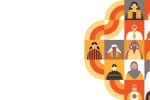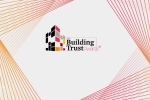PwC Malaysia’s inaugural Building Trust Awards - results
Maybank emerges as Winner,
Nestlé and Sime Darby both named as Runners-Up
KUALA LUMPUR, 30 November 2015 – PwC Malaysia recognised Malaysian public-listed companies which are making strides toward building trust at its inaugural Building Trust Awards.
A first in Malaysia, the Building Trust Awards assessed how Malaysian companies performed in their corporate reporting (via their annual reports) as well as how they are perceived in the eyes of their investors and customers. Where annual reports explain an organisation’s view of the world, the public perception component of the methodology explains the world’s view of the organisation, providing a more holistic assessment of these organisations’ trust building efforts.
Malayan Banking Berhad (Maybank) emerged as the Winner of the Building Trust Awards at the Awards Ceremony, attended by business leaders and board members.
Both Nestlé (Malaysia) Berhad and Sime Darby Berhad were named as Runners-Up for their efforts in building trust among their stakeholders.
Winning these Awards does not imply that the mentioned companies are the most trustworthy or that they are better trusted than other companies in Malaysia. Instead, these are the companies that are making the most attempts to build trust with their key stakeholders (their investors and customers) by being transparent and authentic in their interactions and communications, as decided by PwC’s independent panel of judges.
Sridharan (Sri) Nair, PwC Malaysia Managing Partner, said:
“Building trust is an ongoing journey for Corporate Malaysia. As an emerging market, it is not surprising that building trust has not been at the top of the agenda for most Malaysian organisations which have been prioritising growth, regionalisation and innovation. Perhaps it is because till now, most businesses assume that trust is an intangible concept that is hard to measure. But via our Awards methodology and research, we are able to demonstrate that trust is not only measurable, but can be a real asset to business.”
Sri, Dato’ Mohammad Faiz Azmi, PwC Malaysia Executive Chairman, and Sir David Tweedie, Chief Judge for the Awards, presented the awards to the winners and acknowledged the finalists.
Sir David Tweedie said:
“I am pleased with the results of these Awards. At the Judges Meeting to deliberate on the winners, there was a lot of robust debate amongst the judges.
“We agreed that there are indeed companies in Malaysia which are making good strides toward building trust. The winners are all making efforts to engage their investors as demonstrated through their corporate reporting. Among the ten companies which were selected as finalists, several best practices stood out in their annual reports. For example, clear disclosure of strategic priorities, linking them to KPIs which were clearly quantified; and specific and insightful disclosure on risks and opportunities.
“In addition, the Trust Profiles that we built for our winners show that their investors and customers perceive them to be making efforts in areas like ‘delivers on their promise’, ‘being responsive to stakeholders’ and ‘cares about the impact their activities make on society as a whole’. According to PwC’s research and testing across focus groups, these are some of the trust drivers which can influence the overall level of trust held by an organisation’s different stakeholder groups.”
The winners were selected via a three-step judging process.
- 10 companies were selected as finalists from Bursa Malaysia’s Top 50 companies, based on their excellence in corporate reporting. This was determined via a benchmarking of their annual reports against the International Integrated Reporting Council (IIRC)’s Integrated Reporting <IR> framework.
- The finalists were: Astro Malaysia Holdings Berhad, British American Tobacco (Malaysia) Berhad, CIMB Group Holdings Berhad, DiGi.com Berhad, Felda Global Ventures Holdings Berhad, Malayan Banking Berhad, Nestlé (Malaysia) Berhad, Public Bank Berhad, Sime Darby Berhad and Telekom Malaysia Berhad.
- The companies’ public perception according to investors and customers were then measured based on relevant publicly available digital data from social media, online forums, blogs, news sites and other online platforms. Digital data generated by the companies themselves were excluded. Individual Trust Profiles were developed using a measurement framework and diagnostics tool developed by PwC UK.
- An independent judging panel, comprising regulators and thought leaders in corporate reporting and building trust issues, selected the winners via a face-to-face deliberation. The judges are:
- Sir David Tweedie (Past Chairman, International Accounting Standards Board and current Chairman of the International Valuation Standards Council) (the Chief Judge);
- Belinda Gibson (Former Deputy Chairman, Australian Securities and Investments Commission; non-Executive Director, Citigroup Pty Ltd);
- Goh Ching Yin (Executive Director, Strategy & Development, Securities Commission Malaysia);
- Raymond Siva (Chief Executive Officer, Edelman Indonesia; formerly Managing Director of Edelman Malaysia)
PwC did not invite submissions for the Building Trust Awards. Instead, by combining an assessment of corporate reporting with how the companies’ own stakeholders view them, PwC was able to provide the Judges with an independent view of how these companies fare in their trust building efforts, one that is not dependent on the size of the company and complexity of the business alone.
Sri said:
“Building trust is a journey, relevant to both established and growing businesses. By employing both Integrated Reporting which looks beyond the financials of the companies, as well as the public perception angle in our methodology, we want to send out a message that we are not just looking at companies that post the highest profits.
“We hope that these Awards will encourage Malaysian companies to rethink their business strategies to reflect trust building as a priority.”
Sir David Tweedie added:
“A key differentiating factor of these Awards is PwC’s unique methodology which leverages on predictive analytics and data gleaned from conversations on social media and other online platforms like blogs and investor forums to provide insight into what the company’s stakeholders perceive of them. Clearly, the proliferation of ‘big data’ and social networking is opening up new opportunities for companies to use information in smarter ways – both to make business decisions and to understand where and how they can build trust with their diverse stakeholders.
“If companies can do the same - that is, by turning data into insight - they will be able to recognise what their key stakeholder groups expect from them, which stakeholder groups to focus their efforts on, how much they should invest in trust, and what the business outcomes of increased trust levels are.”
END
Notes
- For more details on the Building Trust Awards, visit www.pwc.com/my/trust
- Refer to the accompanying Judges Report for more details on the judging process, the finalists and winners.
- Methodology
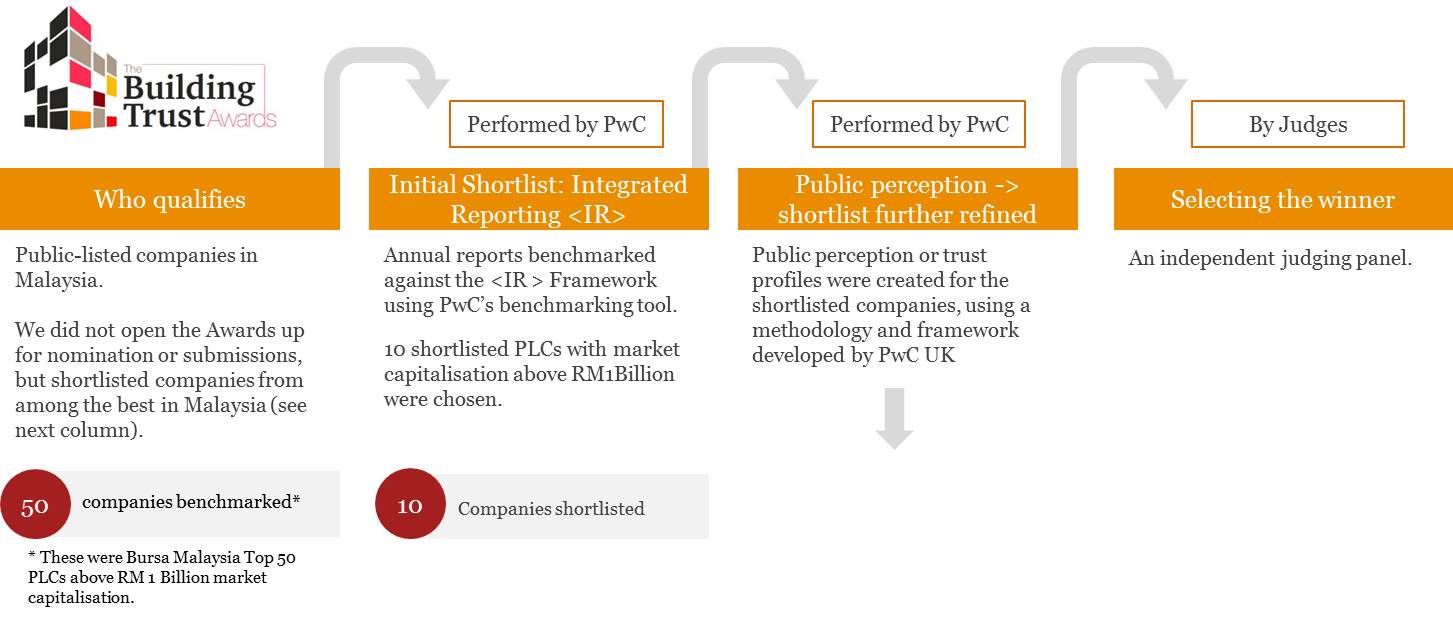
- Excellence in corporate reporting
PwC Malaysia performed a detailed assessment of 110 questions to gauge how the annual reports of Bursa Malaysia’s Top 50 companies address the principles included in the content elements of the International Integrated Reporting Council (IIRC)’s Integrated Reporting Framework.
Our assessment focused on the quality of the information that companies presented in key reporting documents and how well that information was integrated and linked together. The financial year-ends of the annual reports we benchmarked ranged from 31 March 2014 - 31 January 2015.
We published the results of our benchmarking in September 2015 in a report titled ‘Inspiring Trust through Insight.’
- Public perception profiles
Together with PwC UK, Trust Profiles were created for each of the 10 finalists.
These Trust Profiles show how their investors and customers perceive them to be performing from conversations gathered through publicly available digital data – news sites, investor forums, blogs, social media like Facebook and Twitter.
The Trust Profiles measured how investors and customers of the 10 finalists felt, in three different areas of trust which are part of PwC’s Trustworthy Organisation Model (see visual below).
The Trust Profiles show how these stakeholders perceive the company to be performing from January – December 2014 in the following areas:
ENDS
About PwC - Globally
At PwC, our purpose is to build trust in society and solve important problems. We’re a network of firms in 157 countries with more than 208,000 people who are committed to delivering quality in assurance, advisory and tax services. Find out more and tell us what matters to you by visiting us at www.pwc.com.
PwC refers to the PwC network and/or one or more of its member firms, each of which is a separate legal entity. Please see www.pwc.com/structure for further details.
©2015 PwC. All rights reserved
ENDS
About PwC - Globally
At PwC, our purpose is to build trust in society and solve important problems. We’re a network of firms in 157 countries with more than 208,000 people who are committed to delivering quality in assurance, advisory and tax services. Find out more and tell us what matters to you by visiting us at www.pwc.com.
PwC refers to the PwC network and/or one or more of its member firms, each of which is a separate legal entity. Please see www.pwc.com/structure for further details.
©2015 PwC. All rights reserved
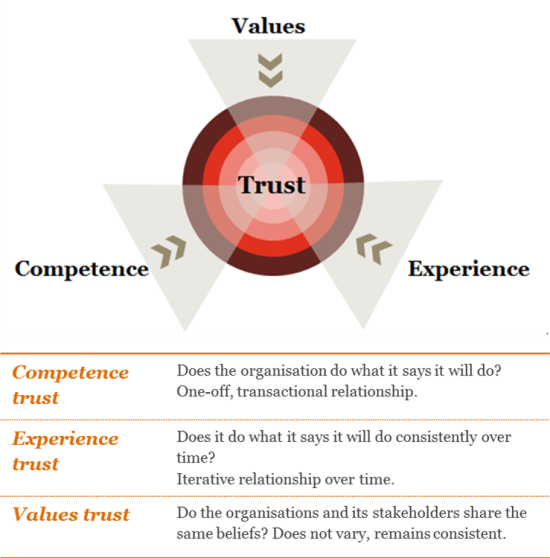
Refer to the whitepaper ‘Understanding the values and drivers of organisational trust: Trust insight’ on the methodology and framework.
- Story behind the logo
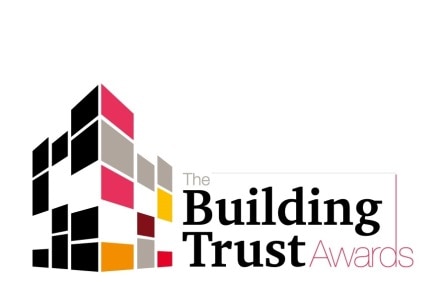
We were inspired by the game JENGA®. The classic block-stacking, stack-crashing game is one that has players attempting to build a tower that gets taller and taller, while removing blocks from its base. One false move, and the structure crashes to the ground.
The process of building trust is much like this game. Like JENGA®, it isn’t for the faint hearted. It can be a painstaking process and it is certainly a journey. One where every action, good and bad, stacks up. At all times it takes all your different players working together to a common goal – fitting together the various pieces to form a structure that doesn’t falter.
About PwC - Globally
At PwC, our purpose is to build trust in society and solve important problems. We’re a network of firms in 157 countries with more than 208,000 people who are committed to delivering quality in assurance, advisory and tax services. Find out more and tell us what matters to you by visiting us at www.pwc.com.
PwC refers to the PwC network and/or one or more of its member firms, each of which is a separate legal entity. Please see www.pwc.com/structure for further details.
©2015 PwC. All rights reserved
